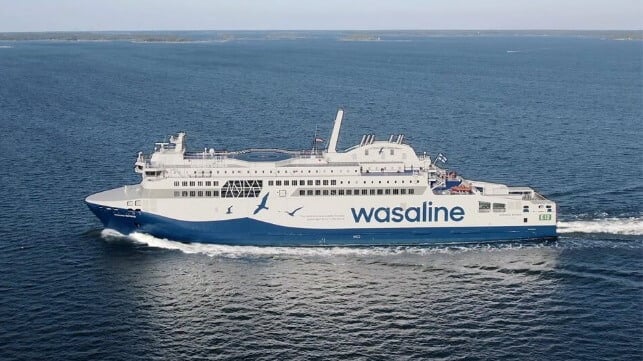Wasaline Will Launch Baltic’s First Carbon-Neutral Shipping Corridor

Finland’s Wasaline will start operating the first carbon-neutral shipping route in the Baltic, achieving the company’s goal that was primarily set for 2030. The company has signed a biogas supply contract with Gasum and a FuelEU Maritime pooling agreement with Stena Line, which will enable its vessel Aurora Botnia to operate exclusively on biofuel and battery power.
“With this unique collaboration with Stena Line and Gasum, Wasaline can achieve carbon neutrality already now as a forerunner for the industry. This also means that all cargo and passengers travelling with Wasaline are sustainable with no additional extra charges for being carbon neutral,” says Peter Ståhlberg, Managing Director of Wasaline.
The company’s daily operation between the port of Vaasa in Finland and Umeå in Sweden will run on certified biogas. DNV, which has been actively collaborating through the Nordic Roadmap to launch Green Shipping Corridors, reports that the route will be recognized as the first international green shipping corridor in operation. The travel time across the Gulf of Bothnia is approximately 3.5 to 4 hours.
Gasum’s bio-LNG is a fully renewable fuel with life-cycle greenhouse gas emissions that are, on average, 90 percent lower when compared with fossil fuel use. The fuel is produced from waste such as biowaste, sewage sludge, manure, and other industrial and agricultural side streams.
The Aurora Botnia (24,300 gross tons) entered service in 2021 and is 492 feet (150 meters) in length with a freight capacity of 1,500 lane meters for trucks and cars. She can accommodate up to 935 passengers. The RoPax is outfitted with dual-fuel Wartsila 31DF engines, capable of running on LNG, liquified biogas, and conventional marine fuels. It initially was also fitted with a 2.4 MWh battery system and will be upgraded with an additional 10.4 MWh, meaning as of January 2026, it will have the largest capacity battery system, 12.6 MWh, fitted on a RoPax. The integrated Wartsila energy management system permits the vessel to switch between fuel and battery modes, enabling fully electric low-speed transits and maneuvering.

that matters most
Get the latest maritime news delivered to your inbox daily.
“By integrating Aurora Botnia into Stena Line’s FuelEU Maritime pool, we gain access to biogas previously unavailable for Stena Line, which enables further emission reductions for the entire pool, lowers fuel costs, and strengthens our strategic position as biofuels become increasingly scarce under more stringent regulations,” explains Niclas Mårtensson, CEO of Stena Line.
The cooperation will support the daily operation of Aurora Botnia. The companies believe it will also provide a pioneering model for the industry to follow.
